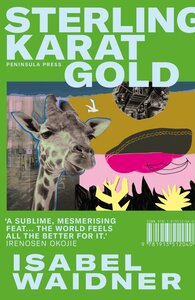Isabel Waidner has been shortlisted for the Republic of Consciousness Prize twice and the Goldsmiths Prize once, which puts their work squarely in my area of interest. I had tried Waidner’s previous novel, We Are Made of Diamond Stuff, but… well, it just didn’t click with me. But I wasn’t going to give up.
Sterling Karat Gold was a recent Republic of Consciousness Book of the Month, and I was determined to meet it halfway. “‘Different’ doesn’t need to be scary or boring or hard; it can be fun,” says Waidner in a recent interview. So I thought: just go with the flow.
This time, the book clicked.
Any synopsis I give will be inadequate, because there’s so much going on, and because so much is in the actual experience of reading. But let’s see… This is how the narrator introduces themself:
I’m Sterling. Lost my father to AIDS, my mother to alcoholism. Lost my country to conservativism, my language to PTSD. Got this England, though. Got this body, this sterling heart.
This paragraph merges the personal, the political, the geographical, the linguistic, and the bodily. And that’s how Waidner’s novel continues.
When we first meet Sterling, they are set upon by a group of matadors, and saved by Rodney, a footballer who sends the bullfighters off. Sterling later goes to a Hendon FC match in search of Rodney, but is arrested by two representatives of the authorities for assaulting one of the matadors. Sterling is taken to a detention centre in Margate on further spurious charges. This results in a trial that takes place in Sterling’s bathroom, muscling in on Catastrophic Foibles, the performance art project that Sterling hosts at home with their best friend Chachki.
Did I mention the time travelling spaceships?
The world of Sterling Karat Gold is a nightmare for Sterling and their friends, because its workings are inexplicable and primed to act against them. The reader gets a sense of this by proxy through the strangeness of what happens, but there are also sharp moments of clarity. For example, there is a powerful chapter of long paragraphs (which you can read in full on the Granta website) in which Sterling reflects on the life of the footballer Justin Fashanu:
…in Chachki’s and my Cataclysmic Foibles lexicon, a ‘spaceship’ is a moment in which discreet neo-authoritarian governance and deliberate governmental deceit become apparent, just momentarily, before vanishing again. What’s that have to do with your life, you might ask, Justin Fashanu, a gay, black footballer, but how the concerted bullying of an individual belonging to more than one oppressed demographic relates to the workings of state control is a pertinent question, and one I ask myself every day.
Alongside this, Sterling Karat Gold is a lot of fun to read – and in that fun, there is hope. A word that came to my mind when reading this book is ‘carnival’, in the sense of entertainment, but also in the sense of the old feast when the structure of society could, in a fashion, be turned upside-down. Sterling and friends are able to take some control back at last.
Published by Peninsula Press.
Click here to read my other reviews of the 2021 Goldsmiths Prize shortlist.

Recent Comments